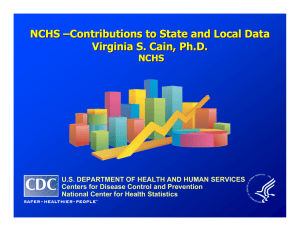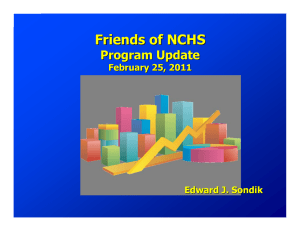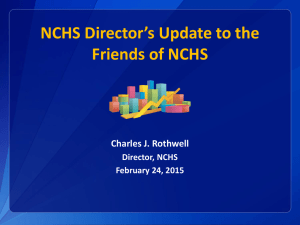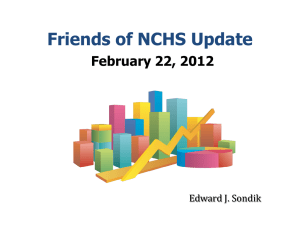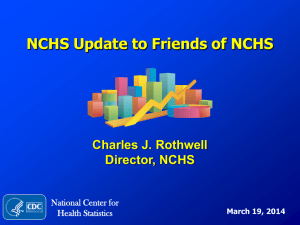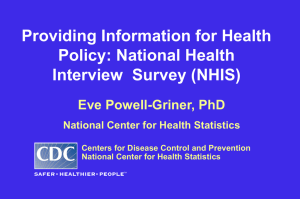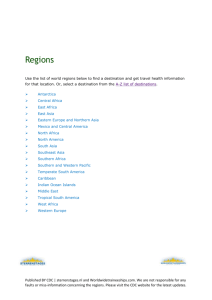Friends of NCHS Update Charles J. Rothwell Acting Director, NCHS
advertisement
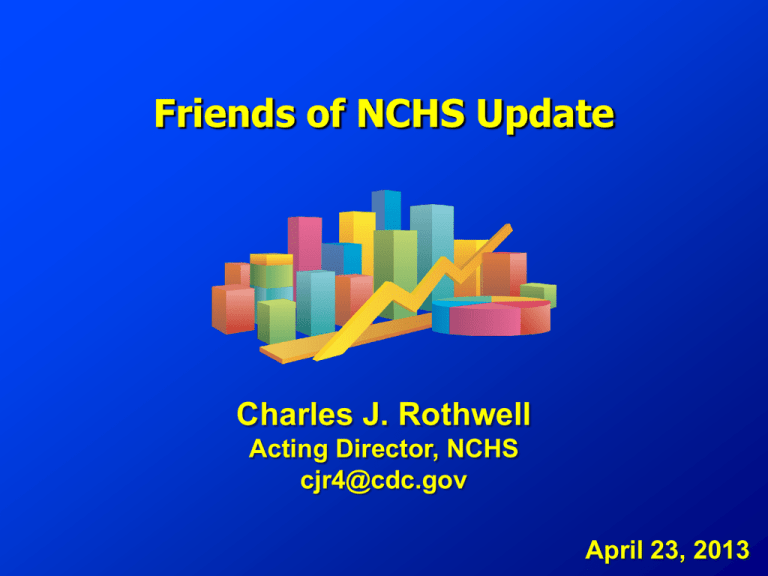
Friends of NCHS Update Charles J. Rothwell Acting Director, NCHS cjr4@cdc.gov April 23, 2013 THANK YOU! NCHS Data in the News 2012-2013 Selected Reports • Generalist and Specialty Physicians: Supply and Access, 2009–2010 (NAMCS) • Prevalence of Uncontrolled Risk Factors for Cardiovascular Disease: United States, 1999–2010 (NHANES) • Recent Declines in Infant Mortality in the United States, 2005–2011 (NVSS) Today’s Update • • Budget Update Recent Activities and Program Highlights Budget Update FY 2014 Budget Request • $181.475 M for Health Statistics • • +$22.413 M above FY 2012 enacted ($138.683 M) $20.379 for the new Working Capital Fund* • Proposed $22.413 M increase supports: • Phase in electronic death records in remaining jurisdictions • Development and implementation of new sample designs for population-based surveys following 2010 Census • Improvement and expansion of data collection methods * = not an actual budget increase NCHS Budget Chronology (adjusted for Working Capital Fund starting in 2012) PHS Evaluation 200 Working Capital Fund (181.475) 180 Dollars in millions 160 140 (159.062) (160.036) * 20.379 * 20.504 20.379 120 100 80 60 124.701 138.683 138.683 138.683 139.532 159.062 ** 40 20 0 FY 2009 FY 2010 FY 2011 FY 2012 FY 2013 FY 2014 * Working capital funds not received in FY 2012 and FY 2013 – adjusted for comparison to FY 2014 only ** FY 2013 PHS Evaluation Funds not final WCF Overview A WCF will promote effective cost control and increased efficiency for programs and service providers. What is a working capital fund? • A WCF is a revolving fund with no year authority, that allows an agency to bill and collect fees for services and deposit them into the fund to finance the fund’s operations When did CDC receive authorization? • In CDC’s FY 2012 appropriation, Congress authorized CDC to establish a WCF in FY 2014 Why did CDC pursue a working capital fund? • To improve the efficiency and effectiveness of business support services • To promote effective cost control within programs and service organizations • To achieve greater transparency by establishing a standard process for developing and reviewing rates and reporting on the actual costs of services • To enable CDC to finance long-term capital investments, while avoiding cyclical funding spikes How will CDC’s working capital fund operate? • In a WCF environment, programs will request services from service providers and the WCF will bill programs for business services consumed based on preestablished rates. Achieving greater efficiency, transparency, and accountability of business services. -9- WCF Overview: Services WCF is a new funding mechanism for CDC business support services; these services enable programs to achieve the Agency’s mission CDC Mission: Collaborating to create the expertise, information, and tools that people and communities need to protect their health – through health promotion, prevention of disease, injury and disability, and preparedness for new health threats. WCF Service Categories Facilities, Safety, Security, and Logistics Services IT Services, Support, and Infrastructure Management Analysis Support Services Financial Management and Oversight Procurement and Assistance Services Travel Services General Support Services Human Resources Achieving greater efficiency, transparency, and accountability of business services. - 10 - FY 2012 PPHF Activities • $35 M to Healthcare Surveillance/Health Statistics of which $27 M went to NCHS for the following: • NHIS • Additional questions to monitor ACA • Expanded sample size from ≈87,500 persons to ≈108,000 persons; more state estimates • NAMCS/NHAMCS – • Increased sample size from ≈3,000 physicians to ≈20,000; more state estimates • Cardiovascular disease look-back module collected additional data on patients with heart disease and stroke • Funded six states to implement electronic birth record systems and transition to 2003 birth certificate • Monitor implementation of NHANES National Youth Fitness Survey FY 2013 PPHF Activities • $28 M proposed for Healthcare Surveillance/Health Statistics (NCHS share to be determined) • Proposed activities include: • NHIS • Additional questions to monitor ACA • Continue expanded sample size; more state estimates • Testing to add biomarkers (height, weight, BP, dried blood spots • NAMCS/NHAMCS • Continue expanded sample size to permit state-specific estimates of clinical care provided in physician offices and Community Health Centers, including primary prevention and clinical management of risk factors for heart disease and stroke • Fund states to implement electronic birth record systems and transition to 2003 birth certificate and EDR expansion. Activities & Program Highlights Responding to Data Needs for Public Health Policies and Programs Responding to Data Needs: Monitoring Changes in Health and Health Care • Existing questions on NHIS and NAMCS/NHAMCS provide baseline and trend data for items including: • Health insurance • Access to health care • Care provided in physician offices, emergency and outpatient departments and community health centers • New questions added to NHIS address targeted issues (ex. financial burden of medical care) • Added NAMCS/NHAMCS cardiovascular disease lookback module • Larger NHIS and NAMCS sample sizes allow more state-level estimates Percent of adults aged 19-25 with health insurance, by coverage type, and percent uninsured: 2009 – Q3 2012 60 Private 50 Percent 40 35.6 Uninsured 26.3 30 Public 20 10 0 Q1 2009 Q2 Q3 Q4 Q1 Q2 Q3 Q4 Q1 2010 Q2 Q3 Q4 Q1 2011 Q2 Q3 2012 Source: Cohen RA, Martinez ME. Health insurance coverage: Early release of estimates from the National Health Interview Survey, January – September 2012. National Center for Health Statistics. March 2013. Responding to Data Needs: Targeted Populations • NHIS is collecting sexual identity for the first time • Completed NHANES National Youth Fitness Survey in 2012, first assessment of youth physical activity in over 20 years • Continue to oversample Asian Americans in the NHIS and NHANES Responding to Data Needs: Monitoring Long-Term Care • The new National Study of Long-Term Care Providers (NSLTCP) will replace NCHS’ previous periodic nationally representative surveys • NSLTCP will be conducted every other year starting in 2012 • First data release: late 2013 Responding to Data Needs: Innovative and Complementary Survey Designs • Testing methods for collecting biomeasures in the home as part of the NHIS • • • • • Height Weight Dry blood spots Blood pressure Launching a web and phone follow-back survey with sample of NHIS respondents: ACA-related questions Responding to Data Needs: Improved Timeliness for Vital Statistics • 2011 preliminary reports for births and deaths published 9 months after the close of the year ... Best in many years. • 2012 preliminary reports will come out even faster ... late this summer! • Final files released earlier • National Death Index more current and flexible • Fetal death reports and data will be caught up this year: 2007-2011 Responding to Data Needs: Health, United States 2012 • • Release expected in mid May • New interactive Health, United States, 2011: In Brief lets users customize charts and tables (2012 release later in summer) Special feature: Emergency Care in the United States • http://archive.nlm.nih.gov/proj/IP/h us11/InBrief.html THANK YOU!
